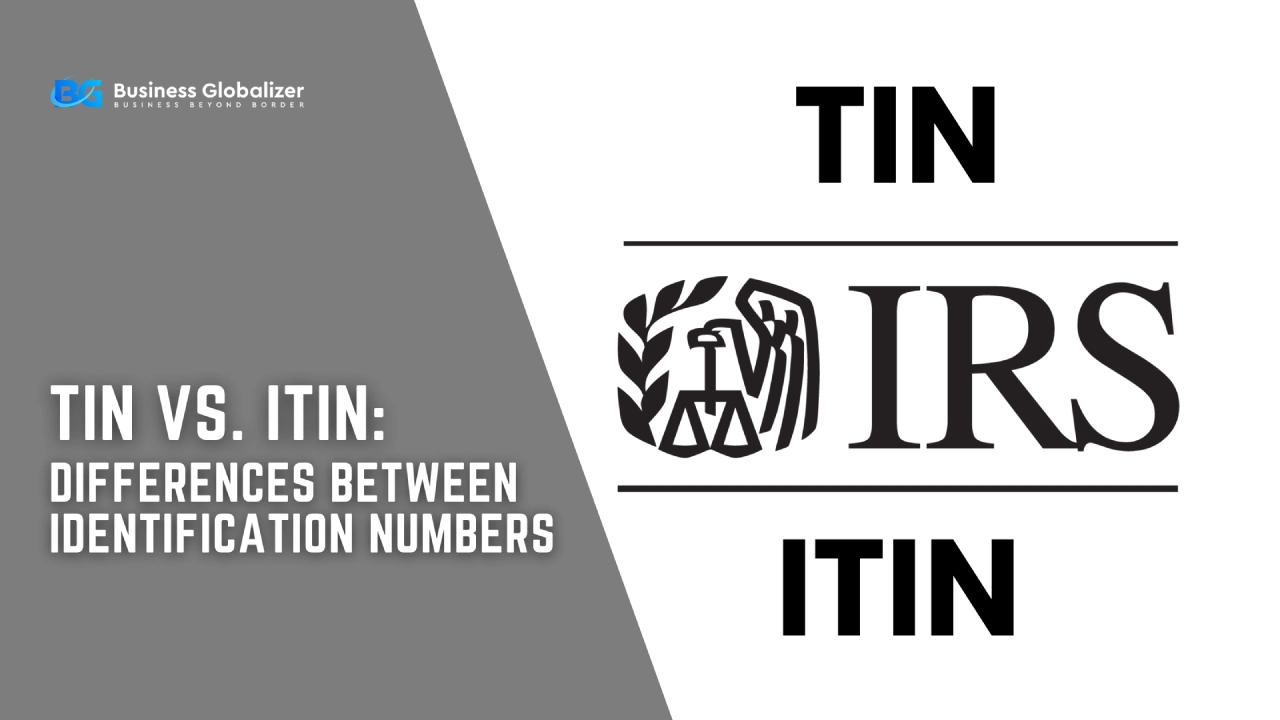The terms “TIN” and “ITIN” are quite confusing, as they both refer to identification numbers used for tax purposes. Many people struggle to distinguish between the two, leading to uncertainty about which functions how, or when.
In this guide, we’ll shed light on TIN vs. ITIN, helping you understand their differences and determine which identification number is right for you.
Let’s unravel the mystery behind these identification numbers and clear up any misconceptions.
What Is TIN?
A TIN is a unique identifier assigned by the Internal Revenue Service (IRS) to individuals and entities for tax purposes in the United States. This number serves as a means of tracking financial activities and ensuring compliance with tax regulations.
TINs come in various forms:
- Social Security Numbers (SSN): The Social Security Administration issues SSNs, a unique identifier for U.S. citizens and authorized residents, mainly for Social Security tracking and tax reporting.
- Employer Identification Numbers (EIN): The IRS assigns a nine-digit EIN to U.S. businesses for identification, tax administration, and reporting employment taxes.
- Individual Taxpayer Identification Number (ITIN): The IRS issues ITINs to individuals needing a U.S. taxpayer identification number but ineligible for an SSN, for tax processing purposes.
- Adoption Taxpayer Identification Number (ATIN): The IRS provides an ATIN as a temporary tax ID for those adopting a U.S. child and needing a tax identifier before obtaining the child’s SSN for tax purposes.
- Preparer Taxpayer Identification Number (PTIN): Assigned by the IRS, a PTIN is required for anyone compensated for preparing or assisting in preparing federal tax returns, promoting tax preparation accountability and law compliance.
Each type of TIN serves a specific purpose, depending on the entity or individual it is assigned to. Understanding the nuances of each type of TIN is essential for fulfilling your tax responsibilities and ensuring smooth financial transactions.
Purpose of TINs
The primary purpose of a TIN is to facilitate the efficient administration of the tax system by providing a unique identifier for individuals and entities. Here’s why TINs are essential:
- Tax Compliance: TINs ensure that individuals and entities meet their tax obligations by accurately reporting income, filing tax returns, and paying taxes owed. Without a TIN, it would be challenging for tax authorities to track and verify financial activities.
- Identification: TINs serve as a means of identification for various financial transactions and interactions with government agencies and financial institutions. Whether you’re opening a bank account, applying for a loan, or conducting business transactions, a TIN is often required to verify your identity.
- Preventing Fraud: TINs help prevent fraud and identity theft by enabling the verification of individuals’ identities and monitoring their financial activities. By requiring TINs for tax-related matters and financial transactions, authorities can reduce the risk of fraudulent activities.
- International Transactions: For non-residents and foreign entities conducting business in the United States, TINs are crucial for complying with tax laws and regulations. The IRS issues ITINs (through W-7 forms) to individuals to facilitate their tax compliance.
- Reporting and Documentation: TINs are used extensively for reporting income, withholding taxes, and issuing tax-related documents such as W-2 forms for employees and 1099 forms for contractors. Proper documentation and reporting of TINs ensure transparency and accuracy in tax reporting.
Overall, the purpose of TINs is to streamline tax administration, enhance taxpayer accountability, and facilitate the fair and equitable collection of taxes.
What Is ITIN?
Continuing our exploration of TIN vs. ITIN, let’s now focus on understanding what an Individual Taxpayer Identification Number (ITIN) is and its significance in the realm of taxation.
Similar to other types of TINs, the ITIN serves as a unique identifier for individuals who are required to file U.S. tax returns but are ineligible for Social Security Numbers (SSNs). This includes non-resident aliens, dependents of U.S. citizens or residents, and individuals residing abroad who have U.S. tax obligations.
The ITIN is issued by the Internal Revenue Service (IRS) to individuals who need to report income or pay taxes in the United States but do not qualify for an SSN. It enables these individuals to comply with tax laws and regulations, ensuring that they fulfill their tax obligations even without a traditional SSN.
Obtaining an ITIN involves submitting the appropriate documentation and application to the IRS, along with your tax return or other tax-related documents. Once approved, the ITIN remains valid for use in future tax filings and financial transactions.
Purpose of ITIN
The ITIN’s primary purpose is to allow individuals who are ineligible for a Social Security Number (SSN) to comply with US tax laws and regulations. Here’s why ITINs are essential:
- Tax Compliance for Non-Residents: ITINs allow non-resident aliens, individuals residing abroad, and other non-citizens with U.S. tax obligations to fulfill their tax responsibilities. Without an ITIN, these individuals would face challenges in reporting income, filing tax returns, and meeting their tax obligations in the United States.
- Dependency Claims: Individuals who are claimed as dependents on a U.S. tax return but do not have an SSN are eligible for an ITIN. This allows them to be properly accounted for in tax filings and ensures that taxpayers receive eligible deductions and credits for dependents.
- Reporting Income and Withholding Taxes: ITINs are used for reporting income, withholding taxes, and issuing tax-related documents. By providing an ITIN, individuals can accurately report their income and ensure compliance with tax laws.
- Opening Bank Accounts and Financial Transactions: Many financial institutions require a TIN, including an ITIN, to open bank accounts, apply for loans, and conduct other financial transactions. Having an ITIN enables individuals without a SSN to access financial services and participate in the U.S. economy.
- Taxpayer Identification: Similar to other TINs, the ITIN serves as a means of identification for tax purposes, enabling government agencies and financial institutions to verify individuals’ identities and monitor their financial activities.
Differences Between ITIN and TIN
At this point, we’ve explored both the Taxpayer Identification Number (TIN) and the Individual Taxpayer Identification Number (ITIN), let’s compare and contrast these two essential identifiers to better understand their distinctions:

Eligibility Criteria
TIN: TINs encompass various identification numbers, including Social Security Numbers (SSNs) for U.S. citizens and permanent residents, and Employer Identification Numbers (EINs) for businesses and entities.
ITIN: ITINs are specifically designed for individuals who are not eligible for an SSN but have U.S. tax obligations, such as non-resident aliens, dependents of U.S. citizens or residents, and individuals residing abroad.
Issuing Authority
TIN: TINs, are typically issued by the Internal Revenue Service (IRS) for tax purposes. Though SSNs are issued by the Social Security Administration (SSA).
ITIN: ITINs are also issued by the IRS but are specifically designated for individuals who cannot obtain an SSN.
Purpose and Usage
TIN: TINs serve a broader range of purposes beyond taxation, including identification for various financial transactions and interactions with government agencies and financial institutions.
ITIN: ITINs are primarily used to facilitate tax compliance for individuals who are ineligible for a Social Security number. While they can be used for certain financial transactions, their scope is primarily focused on tax-related matters.
Applicability
TIN: TINs apply to a wide range of individuals and entities, including U.S. citizens, permanent residents, businesses, and other legal entities.
ITIN: ITINs are specifically intended for individuals who do not qualify for an SSN but need to comply with U.S. tax laws, such as non-resident aliens and certain dependents.
Documentation Requirements
TIN: The documentation required to obtain a TIN varies depending on the type of TIN sought (e.g., SSN or EIN) and the individual or entity applying for it.
ITIN: To obtain an ITIN, individuals must submit specific documentation to the IRS, including a completed Form W-7 and supporting identification documents, along with their tax return or other tax-related documents.
Remember, all the taxpayer identification numbers aren’t ITIN, but all the individual taxpayer identification numbers are TIN. Here’s a table summarizing TIN vs. ITIN.
| Aspect | TIN | ITIN |
|---|---|---|
| Eligibility Criteria | Various; including residents, nonresidents, business entities, etc. | Specifically for individuals ineligible for SSNs |
| Issuing Authority | Internal Revenue Service (IRS), Social Security Administration (SSA) | Internal Revenue Service (IRS) |
| Purpose and Usage | The broad range of purposes beyond taxation and Identification | Primarily for tax compliance |
| Applicability | A wide range of individuals and entities | Specifically for certain individuals |
| Documentation Required | Varies depending on the type of TIN | Requires submission of specific documentation, including Form W-7 and supporting identification documents, along with tax-related documents. |
FAQs on TIN Vs. ITIN
Q1: How to get ITIN for nonresidents?
Answer: To obtain an ITIN as a nonresident, you need to complete Form W-7, Application for IRS Individual Taxpayer Identification Number, and submit it to the IRS along with your federal income tax return or other required documentation proving your identity and foreign status. Also, you can get your ITIN with IRS certified acceptance agent Business GLobalizer.
Q2: Can I use my Social Security Number (SSN) instead of an ITIN for tax purposes?
Answer: Yes, if you are eligible for an SSN, you should use it for tax purposes instead of an ITIN.
Q3: Do I need to renew my ITIN?
Answer: ITINs expire if not used on a federal tax return for three consecutive years, so it’s essential to renew them to avoid any disruptions in tax filing.
Final Thoughts
In conclusion, understanding the topic of TIN vs. ITIN is vital for meeting legal obligations and compliance effectively. While TINs serve a broader range of purposes, including identification beyond taxation, ITINs specifically cater to individuals ineligible for SSNs but needing to comply with U.S. tax laws.
Whether you’re a U.S. citizen, non-resident alien, or business entity, learning which one ensures your individual or entrepreneurial journey is quite vital.






